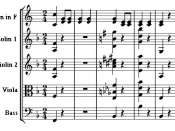The Mozart Effect for Children
Throughout this book the author Don Campbell illustrates the affects of the Mozart Effect on children from pre-birth up until ten years of age. The Mozart Effect is a term signifying the transformational powers of music in health, education, and well-being. It represents the general use of music to reduce stress, depression, or anxiety. It is to induce relaxation or sleep, activate the body, and improve memory awareness. The innovative and experimental uses of music and sound can improve listening disorders, dyslexia, attention deficit disorder, autism, and other mental and physical disorders. This definition is carried through the theme of this book from the first page right up until the back cover.
A major part of this book is the author's explanation, the background, and how the Mozart Effect came to being. The Mozart effect is a study that goes back about fifty years beginning in the late 1950's when Dr.
Alfred Tomatoes studied the auditory stimulation on children with speech and communication disorders. By 1990 there were hundred of centers throughout the world using Mozart's music containing high frequencies, especially the violin to help children with numerous types of disorders as listed in my opening paragraph. In recent decades, an enormous amount of research has been conducted on specific ways in sound, rhythm, and music can improve our lives. The results of the research using Mozart's music have been stunning and have given the rise to the term the Mozart Effect. "I use the phrase to encompass the phenomena as the ability of Mozart's music to temporarily heighten spatial awareness and intelligence, it's power to improve listeners' concentration and speech abilities, it's tendency to advance the jump in reading and language skills among children who receive regular music instruction, and the startling increase in...



Very interesting
This was a really well written and incredibly informative essay which has definitely made me want to look further into the whole Mozart Effect.
Thank you!
2 out of 2 people found this comment useful.